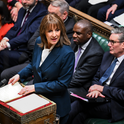Every single Tory leadership candidate is in denial about the two fundamental errors of the 14 years of Conservative rule—namely, austerity and Brexit. So it is hard to see how the party is going to recover, let alone renew.
This is especially true since the party now has two large and viable opposition parties on both its right and left flanks—Reform and the Lib Dems—who have already consumed much of the non-Labour vote, and could quite foreseeably gain more than half of it, if the Tories remain in denial.
If that happens, under first-past-the-post, the Tories could lose most of their remaining 121 seats.
It is also misleading to talk about the historically low Labour vote without emphasising that its vote share last month was over 40 per cent higher than the Tory vote, a record Labour lead.
There is an obvious parallel here. It took just seven years and three elections for the Liberals in the 1920s and 1930s to move from being a plausible contender for power with 159 seats, to a party with fringe status and 33 seats. It is often said that FPTP makes it hard for “minor” parties to break through. But equally, when they do, like Labour in the 1920s, they can have an immediately devastating impact on a declining “major” party.
Big mistakes can’t always be reversed easily, let alone quickly. Rebuilding relations with Europe and rebuilding the public services are both in the “long and difficult” box of the incoming Labour government.
This makes it all the easier for a Tory leader to come out of denial, since they don’t have to commit to, say, re-entering the EU Single Market or big new taxes for the NHS (yet). They just have to accept that serious mistakes were made on Brexit and the funding of the public services, and pledge to support steps towards reversing these mistakes—for example, a better Brexit deal and a fair pay deal for teachers and health care workers. Yet, all the Tory candidates are refusing to do this. They are even crying “betrayal” at the initial steps being taken by Labour, such as the new pay deals for doctors and teachers.
They are also constantly going on about migration—without accepting that the reason for the huge surge in numbers post-2021 was because of the new system instigated to replace free movement within the EU, and that this wouldn’t have happened except for Brexit. Recognising this is the first step towards putting right the wrongs of the last government and moving on.
Part of the problem is that the Tory leadership candidates are afraid of Nigel Farage and his influence on Tory members who will vote in the leadership ballot. So Brexit is off limits, the NHS and public services are marginalised, while migration is front and centre of the debate (and mostly small boat migration at that).
It means that the only mistake the Tory contenders are really owning up to is that they weren’t tough enough on migration and migrants.
This is way off the pitch for middle-ground voters who could vote in still larger numbers for the Lib Dems and Labour. And for those who really believe that immigration is the be-all-and-end-all, Farage is always going to outbid the Tories on anti-immigrant rhetoric and policy. The recent riots demonstrate that comprehensively.













